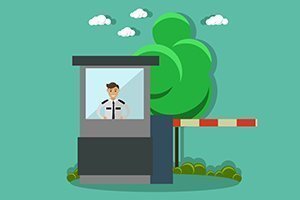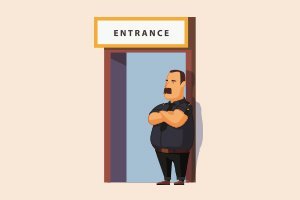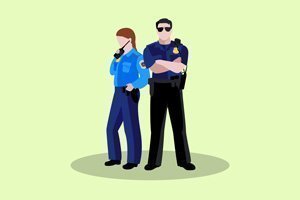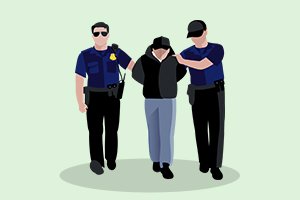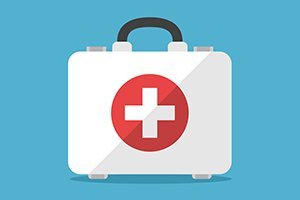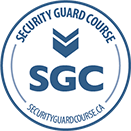Security guards play an essential role in the protection of people, property, information and assets. They are often the front-line of defense in various settings such as shopping malls, industrial sites, corporate and residential buildings.
As crime rates fluctuate and public policing resources become stretched, the need for private security guards continues to increase. For many years now, the number of private security personnel outnumbers police officers in Ontario. The same is true in most other jurisdictions as well, highlighting the growing reliance on private security professionals.
The private security industry in Ontario is governed by the Private Security and Investigative Services Act, 2005 which outlines the legal requirements for anyone working in the industry. The PSISA defines a security guard as someone who, for remuneration, performs work primarily consisting of guarding or patrolling for the purpose of protecting persons or property. To legally work as a security guard in Ontario, you must successfully complete a government-accredited training course, pass an exam, and obtain a security guard licence.
In this post, we will explore the primary duties of a security guard, how the role differs from that of public law enforcement, and how aspiring security guards can get licensed to work in this profession. If you are looking to get started on this rewarding career path, opportunities abound in Ontario, and we will guide you through the steps you need to take to get started.
What are the Primary Responsibilities of a Security Guard?
The core duty of a security guard is the protection of people, property, information and assets. While the manner in which these responsibilities are fulfilled vary depending on the environment, the overarching principle remains the same…ensuring safety. In the majority of cases, security guards are tasked with preventing crimes, identifying and addressing potential hazards, and responding to emergencies and suspicious behavior.
At its heart, the fundamental role of a security guard can be broken down into four main duties: observe, deter, record, and report.
Observe: Security guards conduct patrols, and monitor surveillance systems, searching for signs of potential threats, unusual behaviour, unauthorized access, etc.
Deter: The presence of a uniformed security guard can act as a powerful deterrent for would-be criminals. Knowing that a trained professional is present and watching will discourage many from engaging in wrong-doing.
Record: Keeping detailed notes and records of patrols done, tasks completed, as well as details of incidents that occur is a crucial responsibility of security guards. Proper documentation ensures that any follow-up required, such as police investigations, court proceedings, and internal investigations are done thoroughly and accurately.
Report: When an incident occurs, it is the security guard’s responsibility to report it to the appropriate authorities. That may be their employer, the police, or other emergency services. Strong communication skills are key when addressing security issues.
As security guards perform their duties, they have a responsibility to three key groups:
To their Employer: Security guards are hired specifically to protect their employer’s personnel, property and assets from injury, theft, and damage. This is accomplished through regular patrols, monitoring surveillance systems and following proper processes and procedures.
To the Public: Security guards also have a responsibility to protect the public while they are on their employer’s property. This is particularly relevant in high traffic environments such as shopping malls, entertainment centers, and public event spaces. Security guards may be required to assist in crowd control, screening at points of entry, answering questions, and assisting police during emergencies.
To Themselves: Private security is a profession requiring a high level of integrity. Security guards should prioritize safety when performing their duties, always adhere to the law, understand the limits of their lawful authorities, and the rights and freedoms of others.
How Does Private Security Differ from Public Law Enforcement?
There is a significant distinction between private security and public law enforcement. Public law enforcement agencies, such as municipal, provincial, and federal police services are government-funded and have broad powers to protect the public and enforce the law. Police officers are tasked with maintaining public order, preserving the peace, preventing crimes, investigating incidents, arresting criminals, and testifying in court. They have significant, but not absolute, authority to conduct searches, seize evidence and detain individuals.
Private security on the other hand, provide their services to private sector clients, rather than the general public. Security guards typically work for private businesses, property owners, or private citizens who require protection of their assets, as well as personal safety. While they do not have the same broad legal authorities that the police do, security guards do play a significant role in preventing crimes, deterring undesirable behaviour, and emergency response. In many cases, it will be a security guard who first notices when things are amiss, and is first on scene in an emergency. It is their decision-making and actions that maintain order and control, until the police or other emergency services arrive.
A key difference between public and private law enforcement is jurisdiction. Police officers operate across municipalities (eg. Ottawa Police), provinces (OPP), and the country (RCMP), while security guards are typically limited to the property they have been hired to protect. Additionally, security guards do not have the authority to arrest or detain individuals on suspicion of crime. They can only arrest if they find the individual actually committing the crime. If an arrest is made under those conditions, security guards are required to turn the individual over into the custody of a police officer without delay.
Although there are clear differences, private security and public police often work together in tandem. Since security guards are often the first on scene, they handle the initial response, and gather important information, which can assist the police as the incident unfolds. Security guards can provide further assistance post-incident by providing incident reports, surveillance footage, and acting as a witness during criminal and civil proceedings. This close relationship and collaborative approach helps to ensure that both private and public security efforts contribute to the overall safety of the community.
What Role Do Security Guards Play in Public Safety and Crime Prevention?
Security guards play a pivotal role in deterring crime and enhancing public safety. Their uniformed presence alone is a strong deterrent against thefts, vandalism, or trespassing. Security guards act as the first line of defence in private settings where the public gather, such as retail stores, where loss prevention officers maintain safety and apprehend offenders. In residential and corporate settings, security guards manage access control, monitor fire alarm systems and patrol for unauthorized individuals and safety hazards.
Additionally, security guards play a vital role in emergency situations. Whether it is investigating the source of an alarm, escorting emergency service personnel to the scene of a fire, or securing an unsafe area until it can be made safe again, the security guard’s intimate knowledge of their facility and its policies are an integral part of a swift and efficient emergency response.
Beyond crime prevention, security guards can also play a role in crime investigations. When a crime occurs on their property, security guards are often responsible for securing the scene until the police arrive. Their preliminary observations and information further assists the police in their investigation, as does access to any surveillance footage captured. If required, security guards can also be called upon as witnesses to testify in court about the events they observed.
How Can Someone Become a Licenced Security Guard in Ontario?
The process to become a licenced security guard in Ontario is clearly outlined by the Ministry of the Solicitor General. If you are interested in working as a security guard, you must first complete a government-accredited 40-hour training program that covers the knowledge needed for the role. This training includes topics such as the Private Security and Investigative Services Act, Legal Authorities, Use of Force, and Communication Skills. Further skills can be learned through additional specialized courses such as those offered through securityguardcourse.ca.
Upon completion of the training program, aspiring security guards must pass a multiple-choice exam administered by Serco. This exam assesses your understanding of the course material, and your ability to competently perform the duties of a security guard. The following requirements must also be met:
- Be at least 18 years of age.
- Be legally entitled to work in Canada.
- Have a clean criminal record. (Background checks can be obtained here)
Once completed, applicants can apply for their licence through the ServiceOntario website. The licence must be renewed every two years, with ongoing compliance to the standards outlined by the Ministry, which are subject to change.
If you are looking for the most efficient pathway into the private security industry, securityguardcourse.ca offers a comprehensive and Ministry accredited 40-hour training course. This course will prepare you to pass the licensing exam with ease, and enter the workforce with the knowledge and skills required to succeed.

